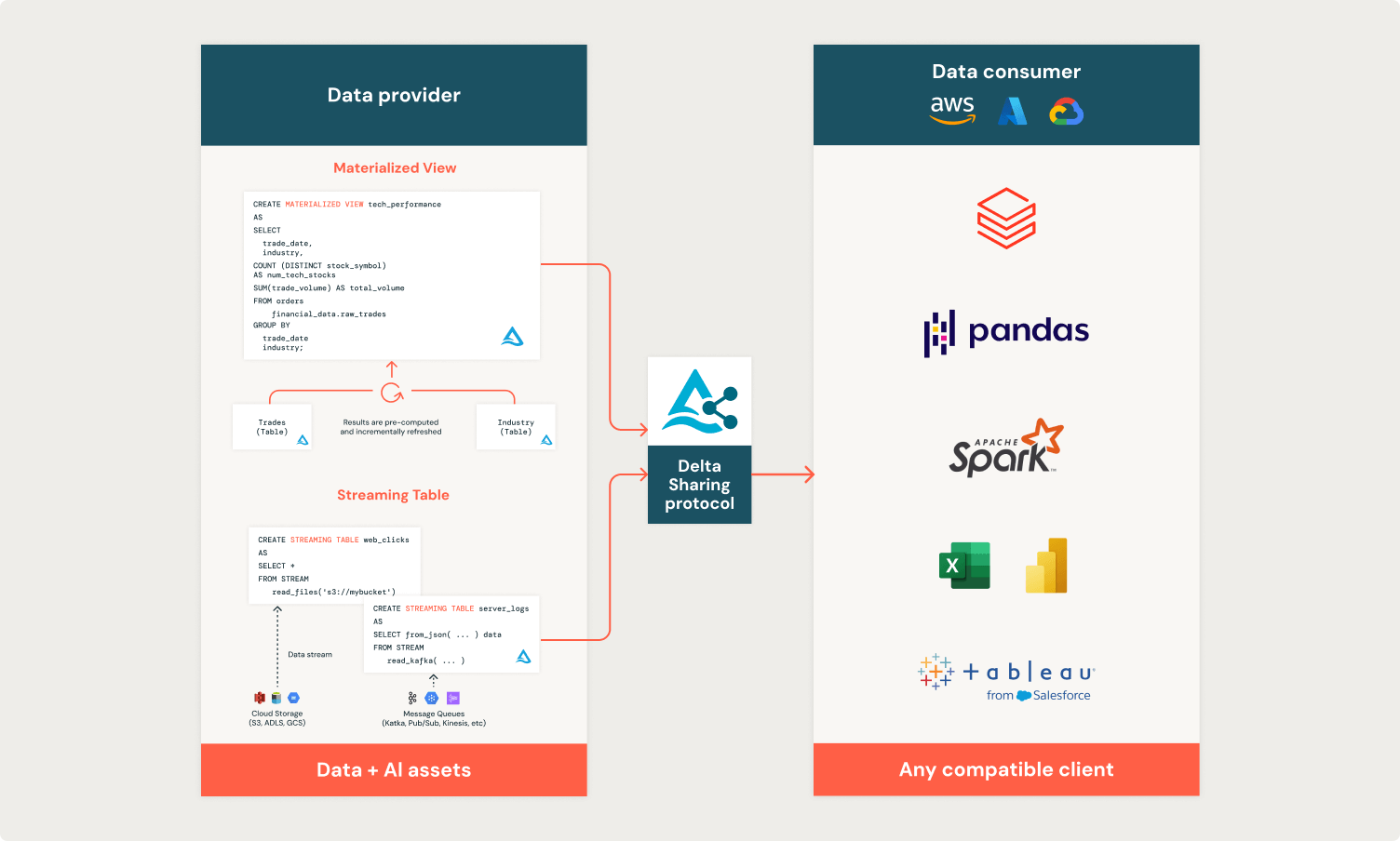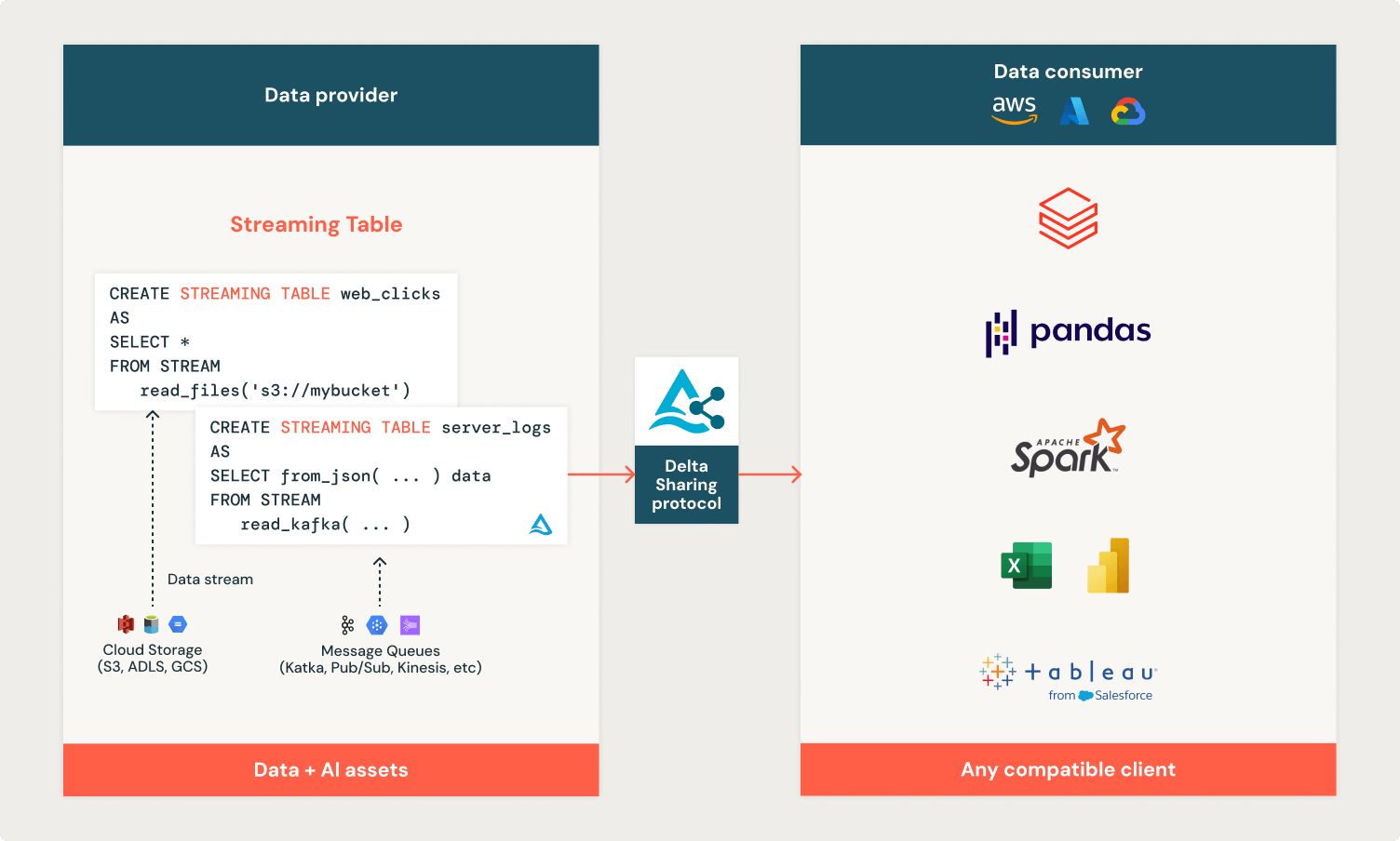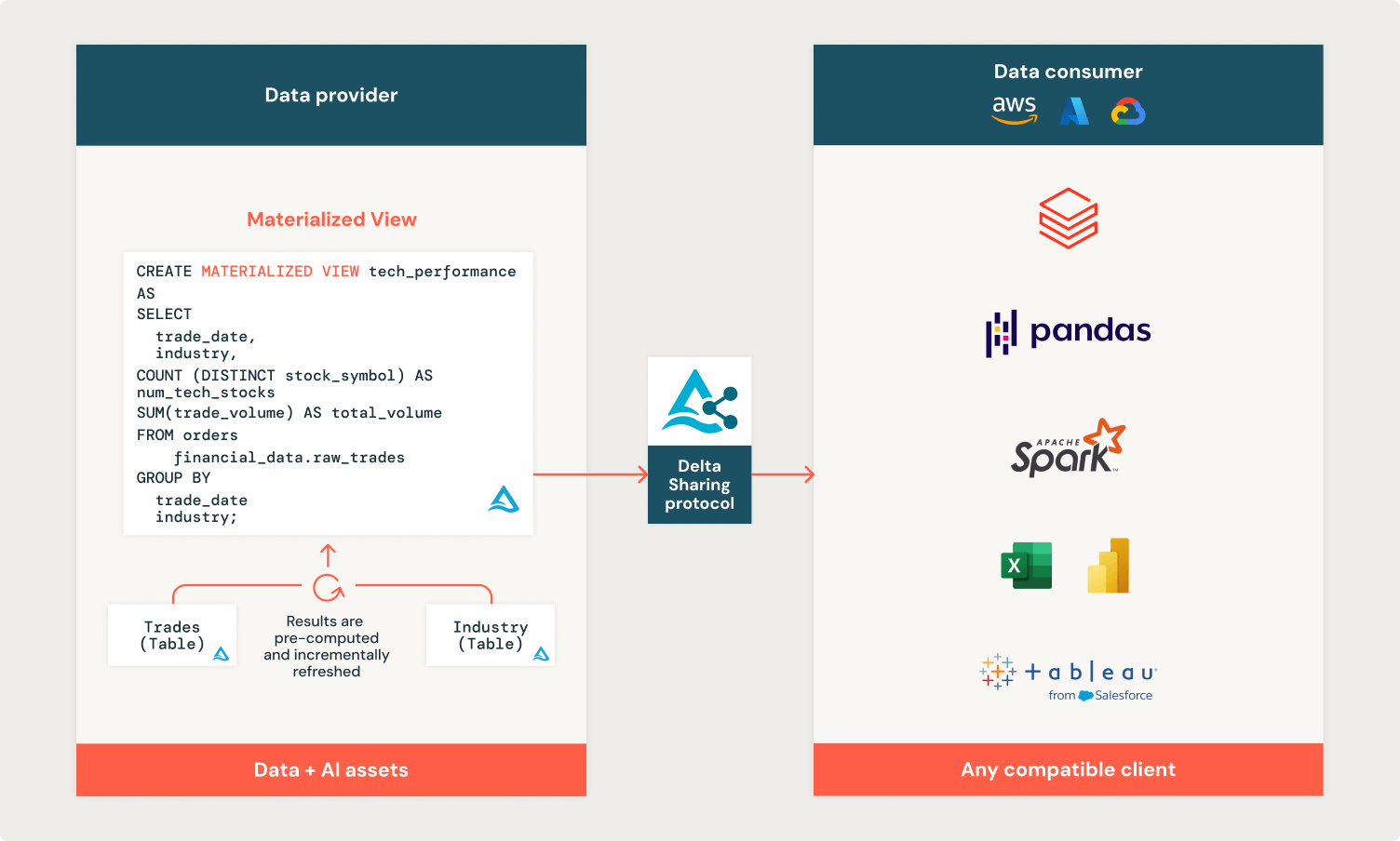We’re thrilled to announce that the sharing of materialized views and streaming tables is now out there in Public Preview. Streaming Tables (STs) repeatedly ingest streaming information, making them very best for real-time information pipelines, whereas materialized Views (MVs) improve the efficiency of SQL analytics and BI dashboards by pre-computing and storing question outcomes prematurely.
On this weblog publish, we’ll discover how sharing these two sorts of property allows information suppliers to enhance efficiency, and scale back prices whereas delivering contemporary information and related information to information recipients.

Understanding Materialized Views and Streaming Tables
Materialized views (MVs) and Streaming tables (STs) each help incremental updates, which helps hold information present and queries environment friendly.
Streaming tables are used to ingest real-time information, typically forming the “bronze” layer the place uncooked information lands first. They’re helpful for sources like logs, occasions, or sensor information.
Materialized views are higher fitted to the “silver” or “gold” layers, the place information is refined or aggregated. They assist scale back question time by precomputing outcomes as an alternative of scanning full base tables.
Each can be utilized collectively—for instance, streaming tables deal with ingesting sensor readings, whereas materialized views run steady calculations, equivalent to detecting uncommon patterns.
Learn this weblog to study extra about Streaming Tables and Materialized Views
Why do information suppliers have to share ST?
Sharing streaming tables (STs) permits information recipients to entry dwell, up-to-date information with out duplicating pipelines or replicating information. Contemplate a situation the place a retail firm must share real-time gross sales information with a logistics companion to help close to real-time supply optimization.
- The corporate builds and maintains a streaming desk in Databricks that repeatedly ingests transactional information from its e-commerce platform. This desk captures occasions equivalent to product purchases, updates stock ranges, and displays the present state of gross sales exercise.
- The corporate makes use of Delta Sharing to share the streaming desk. That is accomplished by making a share in Databricks and including the desk with the next SQL command:
The logistics companion is supplied with credentials and configuration particulars to entry the shared streaming desk from their very own Databricks workspace.
The logistics companion makes use of the dwell gross sales information to foretell supply hotspots, replace automobile routes in actual time, and enhance bundle supply velocity in high-demand areas.

By sharing streaming tables, the logistics companion avoids constructing redundant ETL pipelines, reducing complexity and infrastructure prices. Delta Sharing allows cross-platform entry, so information customers do not have to be on Databricks. Streaming tables could be shared throughout clouds, areas, and platforms.
The info supplier retains full management over entry, utilizing fine-grained permissions managed via Unity Catalog.
Watch this demo to see how an information supplier can share ST with each Databricks customers and different platforms
Why do information suppliers have to share MV?
Sharing solely the Materialized Views quite than the uncooked base tables improves information safety and relevance. It ensures that delicate or pointless fields from the underlying information stay hidden, whereas nonetheless offering the patron with the particular insights they want. This method is particularly helpful when the patron is fascinated by aggregated or filtered outcomes and doesn’t require entry to the complete supply information.
For instance, take into account an information supplier that monetizes monetary market insights. They course of uncooked transactions, equivalent to inventory market trades, and create beneficial aggregated insights (e.g., the day by day efficiency of {industry} sectors). A hedge fund (the client) wants day by day insights in regards to the monetary efficiency of know-how shares however doesn’t wish to course of massive volumes of uncooked transaction information.

As a substitute of sharing uncooked commerce information, information suppliers can create a curated dataset to supply hedge funds with precomputed insights which can be simpler to make use of and interpret.
- The info supplier builds aggregated commerce information to calculate the know-how sector’s day by day efficiency and shops the end result as a materialized view. This MV presents ready-to-use, pre-aggregated insights for downstream customers just like the hedge fund.
- The supplier provides this MV to a safe share object and grants entry to the client’s recipient credentials:
- The hedge fund retrieves the shared MV utilizing analytics instruments equivalent to Python, Tableau, or Databricks SQL. If utilizing Databricks, the recipient can mount the share straight in Unity Catalog. Delta Sharing ensures interoperability the place MVs could be shared throughout completely different platforms, instruments (e.g., Apache Spark™, Pandas, Tableau), and clouds with out being locked right into a single ecosystem.
- The hedge fund can straight use this pre-computed information to drive selections, equivalent to adjusting their funding in know-how shares.
The info supplier has prevented managing advanced, customized pipelines for every buyer. Creating and sharing MVs means there isn’t any longer a necessity to take care of a number of variations of the identical information. All of the unneeded particulars from base tables stay protected whereas nonetheless satisfying the recipient’s information wants. The info recipient will get prompt entry to the curated information and spends assets on evaluation quite than information preparation.
Watch this demo to see how an information supplier can share MV with each Databricks customers and different platforms.
When to make use of Views vs Materialized Views?
Delta Sharing additionally helps cross-platform view sharing, which permits information suppliers to share views utilizing the Delta Sharing protocol. Whereas materialized views are helpful for sharing pre-aggregated outcomes and bettering question efficiency, there are instances the place views could also be a greater match. Delta Sharing additionally helps sharing views throughout platforms, clouds, and areas. In contrast to materialized views, views usually are not precomputed—they’re evaluated at question time. This makes them appropriate for situations that require real-time entry to essentially the most present information or the place completely different customers want to use their very own filters on the fly. Views supply extra flexibility, particularly when efficiency optimization is much less crucial than information freshness or query-specific customization.
How Kaluza is Sharing Materialized Views with Power Companions
Kaluza is a sophisticated power software program platform that allows power suppliers to remodel operations, reinvent the client expertise and optimise power to speed up the transition to a less expensive, greener electrical energy grid.
Power suppliers face rising complexity in managing information from rising numbers of related gadgets, together with electrical automobiles, warmth pumps, photo voltaic panels and batteries in addition to a extra risky power system and complicated buyer wants. Conventional architectures wrestle to ship real-time insights and operational effectivity at scale.
MV/ST sharing will allow an out-of-the-box answer that allows the Kaluza platform to function with decreased engineering complexity. By means of pipelines that output materialized views, Kaluza allows its companions to entry modelled information and reviews for actionable insights. This method streamlines collaboration, reduces integration overhead, and accelerates the supply of latest buyer propositions throughout markets.
“The dimensions and complexity of power information calls for cross-industry collaboration and information sharing. Delta Sharing materialized views facilitate seamless integration with power suppliers, supporting grid decarbonisation and driving worth for each system stakeholders and prospects.”
— Thomas Millross, Information Engineering Supervisor, Kaluza
To wrap issues up, sharing Streaming Tables and Materialized Views makes it simpler to ship contemporary, real-time insights whereas slicing down on prices and complexity. Whether or not you’re sharing dwell information streams or pre-computed outcomes, MV/ST sharing helps you deal with what issues—making higher selections sooner. MV/ST Sharing is now out there in Public Preview. Give it a strive!

